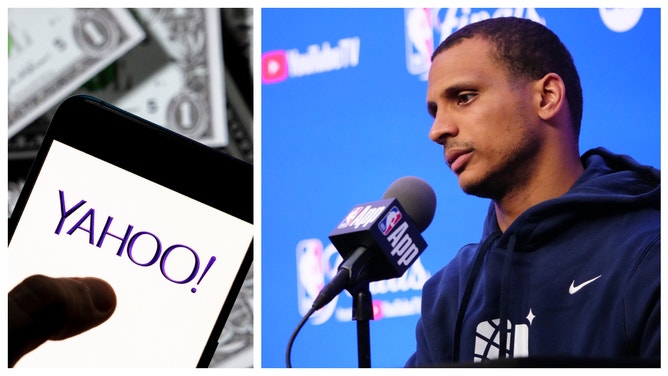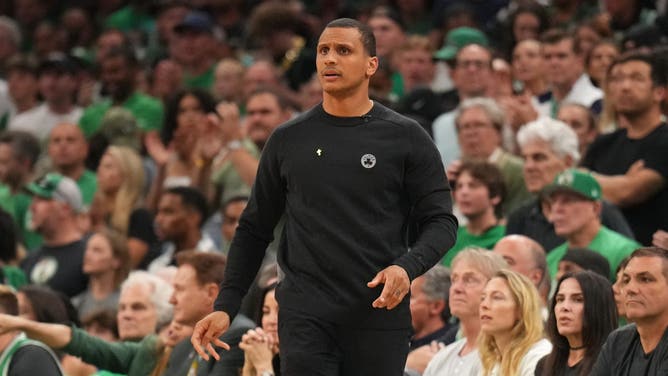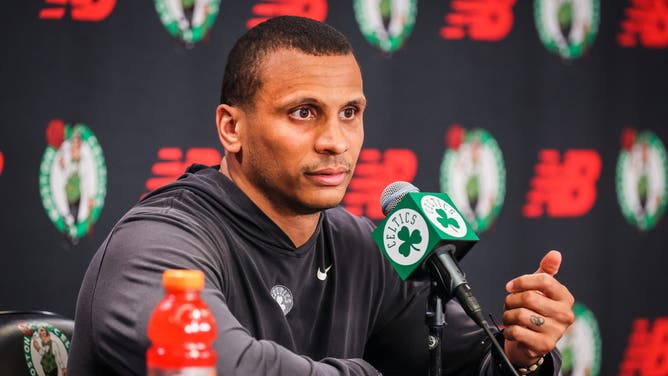Yahoo Writer Who Tried To Race-Bait Celtics Head Coach Joe Mazzula Pens Ridiculous Column | Opinion
On Saturday, Boston Celtics head coach Joe Mazzulla had his standard NBA Finals off-day press conference. A Yahoo Sports writer by the name of Vince Goodwill did what many in the corporate media try to do on a daily basis: make everything about race.
Goodwill asked Mazzulla a meandering question, shoehorning in his own beliefs about race, while trying to get Mazzulla to agree with him. Mazzulla didn't take the bait.
"For the first time since 1975, the NBA Finals [features] two black head coaches," Goodwill begins, letting everyone know where this is heading.
"Given the plight, sometimes, of black head coaches in the NBA, do you think this is a significant moment, do you take pride in this, how do you view this or do you not see it at all?" Goodwin asks.
"I wonder how many of those have been Christian coaches," Mazzulla says, leading to a long silence in the room before the moderator steps in to get the next question.
That certainly could have been the end of this. Goodwill asked his question, Mazzulla essentially side-stepped it, and everyone (well, almost everyone) moved on.
But Goodwill did not, in fact, move on. No, he penned a lengthy column that chastised Mazzulla for side-stepping the question.
Yahoo Sports writer goes after Joe Mazzulla for not answering his race-baiting question
Goodwill posted a column titled, "Celtics coach Joe Mazzulla's unwillingness to discuss race a complicated issue." There seems to be a word missing in that headline, or a comma, or something, but that's word-for-word what it says.
Race is one of the defining issues in this country, and it's not easy to talk about, but when one avoids it, it adds fuel to an already complicated fire.
Talk about a hell of an opening line from Goodwill. "Race is one of the defining issues in this country." Well, it is for people who only see the world through racial-biased glasses, that's for sure. I think we can safely put Goodwill in that category.
"It's not easy to talk about." Again, I'm not sure how Goodwill can write that, given that he and many like him in the media never stop talking about it. It can't be that hard to talk about, since it makes its way into virtually every discussion.

A Yahoo Sports writer tried to bait Boston Celtics head coach Joe Mazzulla into a racism discussion and got angry when the coach didn't oblige.
(Getty Images)
I also love the idea that Mazzulla NOT talking about it "adds fuel to the fire" in Goodwill's mind. He's wrong. Mazzulla not talking about it is a way for us to start putting out this fire, so we can move on to more pressing issues.
It adds fuel to Goodwill's fire, because he had to work even harder to write a racially-based column about the Celtics head coach, who gave him nothing to go off of. But somehow, Goodwill managed to power through and write nearly 1,500 words on the topic.
The column is far too long to address every ridiculous item, but I'm going to go through a few of my favorite "highlights."
Yahoo writer believes the Celtics head coach has a responsibility to talk about race because Boston is inherently racist
[Mazzulla's] relationship with his own racial identity is personal, but his answer certainly opens the door for more questions. Especially because it’s Boston and the NBA’s labor force is overwhelmingly Black.
Goodwill acknowledges that Mazzulla's relationship with his race is personal (duh), but quickly chides him for not sharing those feelings. Feels a bit hypocritical to me.
Then, he moves to a common trope: Boston is just a racist city that hates black people, so Mazzulla, essentially, has a responsibility to address that, according to Goodwill. To prove his point, he cites Bill Russell and Dee Brown.
Neither player has played for Boston since the turn of the century, but that's OK, Goodwill has "proof" of more modern racism in Boston for professional athletes.
Today, you’ll hear things in the stands that make you a little uncomfortable, even if nothing directly racial is said. Oftentimes, it’s just a feeling.
Ah, there we go. Even if no one says or does anything, you can just FEEL the racism in Boston sports arenas. Trust Goodwill, it's there. He said so.

A Yahoo Sports writer tried to bait Boston Celtics head coach Joe Mazzulla into a racism discussion and got angry when the coach didn't oblige.
(Jesse D. Garrabrant/NBAE via Getty Images)
Boston has a sensitivity with race, and other blocs love to avoid any mention of race at all, so there’s a risk of Mazzulla’s words on this grand stage being co-opted in ways he didn’t intend. Not just for the religious right, but the bad actors who love jumping on statements like that to quiet conversations.
This stuff drives me more insane than anything. It's not just a critique of Goodwill, but the people who never stop bringing race into every discussion. This idea that "bad actors" are trying to "quiet conversations" and that's a bad thing is absurd.
See, in Goodwill's world, we should never stop talking about race. But let me ask you something. We've had more conversations about race over the past 10-12 years than at any time in modern history.
Are race relations getting better, thanks to these conversations? No, in fact, theyr'e getting worse. Just look at any poll on how Americans feel about race relations. The more we talk about it, the worse it makes everyone feel.
The argument that we MUST talk about race every single day and its impact on every, single interaction and moment is just flat-out incorrect. The data tells us that the exact opposite is true. Perhaps Mazzulla understands that better than Goodwill. Sure seems like he does. We should applaud that.
Mazzulla isn't embracing his "blackness" enough for the left-wing race-baiters.
It isn’t Mazzulla’s fault the history is the history. But he should at least be aware of it. Ignoring race in these matters isn't progress, because it can infer that seeing someone as Black means something negative. Colorblindness is impossible, and seeing someone's Blackness or the Black experience as a positive could be the ultimate sign of progress.
"Ignoring race in these matters isn't progress." Actually, yes it is. When we stop seeing people as black coaches and white coaches and just see them as coaches, that's absolutely progress. It's a clear truth that seems to evade Goodwill.
"It can infer that seeing someone as Black means something negative." How? If you're going to make a statement like that, you need to defend it.

A Yahoo Sports writer tried to bait Boston Celtics head coach Joe Mazzulla into a racism discussion and got angry when the coach didn't oblige.
(Erin Clark/The Boston Globe via Getty Images)
"Seeing someone's Blackness or the Black experience as a positive could be the ultimate sign of progress." Again, how? These are platitudes that have no real meaning, and I'm not sure even Goodwill knows what this is supposed to mean.
This is a paragraph that sounds really profound until you start really breaking down the language. That's when you realize Goodwill wrote a lot of words but didn't actually say anything. This is another common trope for people who don't have facts, logic and reason on their side.
Goodwill spends a big chunk of the article praising people like Adam Silver and Jason Kidd because they DO talk about race all the time. It's hard to criticize Silver, honestly, because he just helped the NBA secure a massive rights deal for a league that's losing popularity. That's an accomplishment, no matter how you slice it.
But then comes the closing paragraph, the coup de grâce of Goodwill's piece.
But if he’s pulled over in Boston, the police will see his last name on his license, but before they find out anything else about him, they’ll see a Black man first.
Wow. So, Goodwill ends his "profound" article with an assertion that Boston police are racists who only see skin color when they pull people over.
He makes the case earlier in the piece that "bad actors" (and he means media entitles like OutKick, by the way) are trying to shut down conversations about race, which makes us the bad guys.
The other side of that, naturally, is that people like Goodwill are the good guys for constantly shoving race down everyone's throats and stoking racial tensions by calling an entire city and its police force racist.
I know we live in an upside-down world, but it still never ceases to amaze me that the people who sell racism for a living are 100% certain that they're the "good guys" in this story.